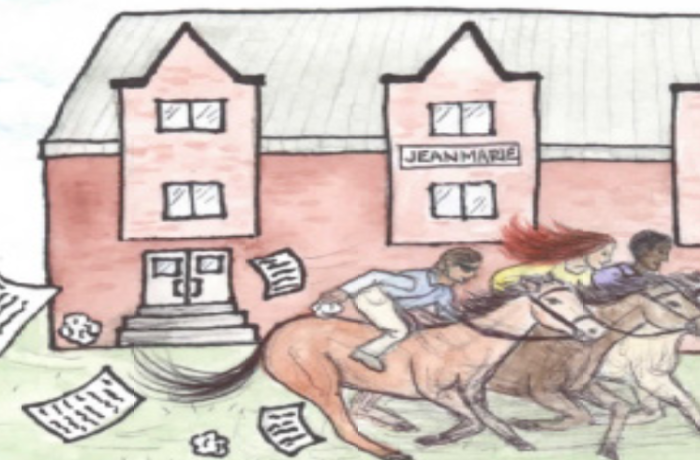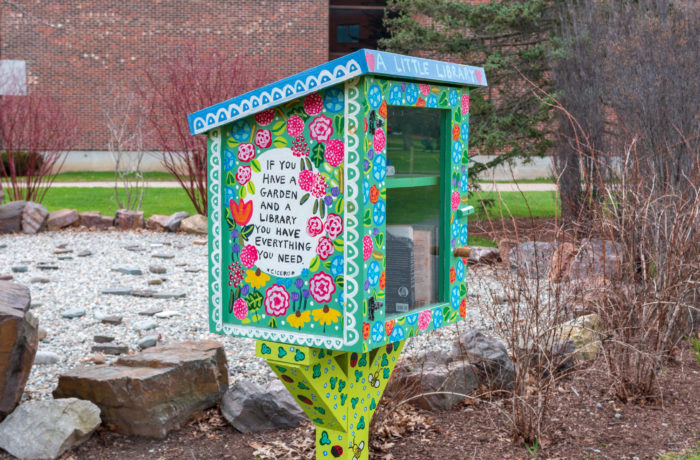
By Devin Imperati
A unique friendship and a remarkable history sparked St. Michael’s College English major, Julia Wagner, ‘18, to write a research project blending memoir and historical account. The spark eventually led to preserving the legacy of one of the first female World War II navy yard welders, Margaret ‘Peggy’ Citarella. Citarella began welding in 1941 at age 21, when she realized that men’s jobs paid more than women’s, and that because of the war, more jobs normally exclusive to men were becoming available to women.
It was in the 1940s that Citarella entered a navy yard, approached a secretary, and asked for a job. The secretary assumed that as a woman Citarella was seeking a desk job, and because there were no secretarial positions available, she was turned away. But Citarella explained that she was a welder, and asked to speak to the supervisor. Citarella stood her ground when the supervisor repeated that no secretarial jobs were available.
“‘No, let me show you what I can do’,” Citarella said. The supervisor tested Citarella, even going so far as to having her perform welds that were largely unnecessary. She passed them all, and was hired on the spot.
“She was definitely a person who broke a lot of gender barriers during that time,” Wagner said. “Welding was what she wanted to do, and she knew it, and she wanted to pursue it.”
Wagner, who recorded this and other stories from Citarella’s life was awarded a research grant by the office of the vice president of academic affairs (VPAA) at St. Michael’s College. She will present at the Posters on The Hill in Washington D.C. on April 25 and 26.
Throughout her career at the navy yard, Citarella performed a number of different welding jobs, from repairing the masts of ships at sea to taking advantage of her small stature to patch metals in confined spaces. When the war ended, she and the other female welders who were eventually hired due to the lack of male welders available during WWII were dismissed, and though she never continued to weld professionally, her skills never left her. If she or a neighbor ever needed something welded, she would hurry over and patch it for them.
“I found out about her first in high school,” Wagner said, recounting when she and Citarella first crossed paths. “She put out an advertisement, —at that point I think she was 92—asking for some help around the house. So I went and we eventually got to know each other. She was telling me these stories about her life, and she has so many amazing stories, but the one that stood out to me the most was her work in the Charleston Navy Yard during World War II.”
Citarella is now 96 years old and lives in Burlington, Vermont. Her late husband, Professor Emeritus Armand “Doc” Citarella, was a Classics and Humanities professor at St. Michael’s College for more than 50 years. After Armand Citarella died, history professor George Dameron suggested to Wagner that someone ought to record Peggy Ciratella’s story, as no one had been able to preserve her husband’s life story.
From the end of June to August of 2015, Wagner worked with Citarella to record the unusual story of the older woman’s life.
“I think we have a beautiful January-December relationship,” said Citarella of Wagner. “I’m in my 90’s and she’s still a teenager. And we like each other very much; whenever we get together, it’s always a nice experience.”
“I think they have a very special relationship,” said Karen Talentino, St. Michael’s vice president for academic affairs. “You can tell they both really love one another.”
“She’s had a really big [impact on my life],” Wagner said of Citarella, “partially because I do consider her to be one of my very good friends, despite our age difference. I think that we’ve grown together in many ways, not only through this research, but I’d say just being able to work for her. It was something that we could kind of share our lives together, and I think it was valuable to both of us.”
Wagner is currently working on the final edits for her research project in the hopes of getting it archived in Durick Library on campus. Wagner’s research will also be archived in the Charleston Navy Yard.


